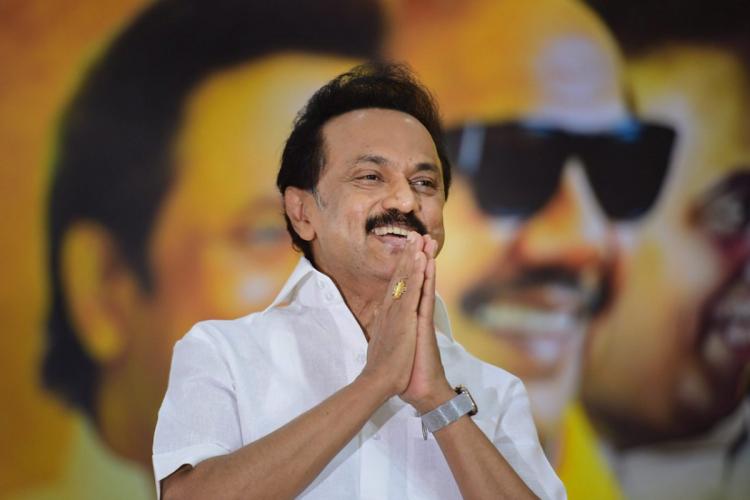
Stalin doesn’t need Hindutva crutch to achieve target of trillion-dollar economy

Tamil Nadu Chief Minister MK Stalin is comfortably placed as the elected head of a large state whose indicators are showing positive signs nationally. But there is one thing that seems to be making the crown rest uneasy on his head – the raging rhetoric of polarisation as saffron tides rise all around.
In some ways, Stalin’s lieutenants want to imagine their leader as one of those escape artists who need to break the cuffs and smash the water-filled glass cage by pulling off an unimaginable stunt to escape unhurt.
For the uninitiated, this unimaginable and unnecessary stunt for a dyed-in-the-wool Dravidian leader in Tamil Nadu is the perceived need to identify his closeness to Hinduism and the Hindu community.
Majoritarian polarisation is not yet a threat to the local politics of the state. During Parliamentary elections, Tamil Nadu has seen majority vs minority politics play out in some pockets. Some would say it was prominent in the state’s southernmost parliamentary constituency – Kanyakumari. However, there has not been a strong spillover of polarisation on communal or religious lines so far in any of the Assembly elections that the state has seen so far.
Also read: Why Stalin should address corruption first before raising MGNREGA
In the four Assembly constituencies where BJP has won for the first time in Tamil Nadu, it was not the communal rhetoric that helped the candidates win as much as the toil of those winning candidates in their respective constituencies, claim the winning candidates. During his election campaign in March, the winning BJP candidate from Nagercoil MR Gandhi had told The Federal, “It is true people consider BJP as a communal force. There is a fear among the minorities. We try to allay their doubts and fears through conversations with them.”
Back to the chief minister.
April 27 was a long Wednesday for Chief Minister MK Stalin. He rushed to Thanjavur from his residence in Chennai early to visit bereaved families and inspect the site where a terrible tragedy had unfolded. Eleven people were electrocuted in a temple car festival held in the early hours. Prime Minister Narendra Modi announced a solatium of ₹2 lakh to each of the families of the deceased. Chief Minister MK Stalin on behalf of the state handed over cheques of ₹5 lakh each to the families. Stalin then returned to Chennai to attend a meeting of Hindu religious leaders at the secretariat.
In the meeting, heads of Hindu religious mutts or Aadheenams administering temples in Tamil Nadu urged the chief minister to regularly re-convene Aanmeega Peravai or (Hindu) religious forums involving all Hindu religious heads in the state. It was on the same day that one of the key ministers in Stalin’s cabinet – Sekar Babu – had called the DMK government a “spiritual government” on the floor of the state Assembly.
Although it was a hurried utterance from Sekar Babu as he was addressing the speaker about what he termed as improper conduct of the opposition AIADMK legislators in the Assembly, it turned heads. If you paused the assembly tapes and ran it again, Sekar Babu will be heard telling the Speaker that if only the AIADMK did not walk out and patiently listened to the reply by the ruling DMK MLA, the opposition leaders will accept that this is a “good government” and a “spiritual government”.
It was not a slip. It was the spilling of a compulsive thought among core DMK leaders who think they have to be overly conscious of their moves with respect to majoritarian appeasement. The compelling need to identify with Hindus in the state and the need to be seen as being extremely sensitive to Hindu religious sentiments.
Now to the indicators. Tamil Nadu’s Gross State Domestic Product (GSDP) for 2021-22, as stated in the 2022-23 budget, is ₹21,79,655 crore. According to Finance Minister PTR Palanivel Thiaga Rajan, the state requires a little over 13 per cent of nominal growth to achieve the set target of a trillion-dollar economy by 2030. With the DMK government off to a good start after having achieved a nominal growth of 14.5 per cent in its first year, industry experts agree that the projected 14 per cent should help it inch closer to the target.
Industry veterans have been whispering about Tamil Nadu losing investments from Kia Motors, Kitex Garments, and Qualcomm to other states in the recent past and are hoping that the DMK will stay the course and vie aggressively for big investments by capitalising on a stable political climate enabled by a strong mandate.
At a policy level, the DMK is taking on the BJP-led central government head-on on issues including the National Eligibility-cum-Entrance Test (NEET), National Education Policy (NEP) and against the ‘imposition’ of Hindi. But that is the federal pedal that the DMK believes it has to keep its foot on, for good polity and for its political sustenance. But these are institutional and organisational challenges that the DMK will have to deal with as long as it remains in power.
Also read: TN clips Governor’s powers, adopts Bill to appoint university VCs
As a democratically elected party in the state, the DMK and its leader owe only the performance of the state to its people and not the party’s allegiance to its existing or adapted ideologies for protection from perceived threats. The people of Tamil Nadu have repeatedly chosen who they think they deserve to be ruled by. The people want their government to do what is best for them. There is no need for the leadership that emerges victorious by its people’s mandate to wear a leather jacket and dodge rubber bullets now.


